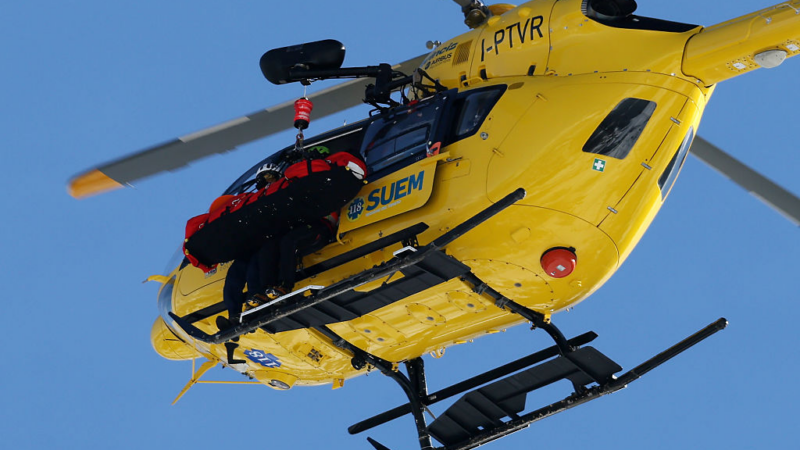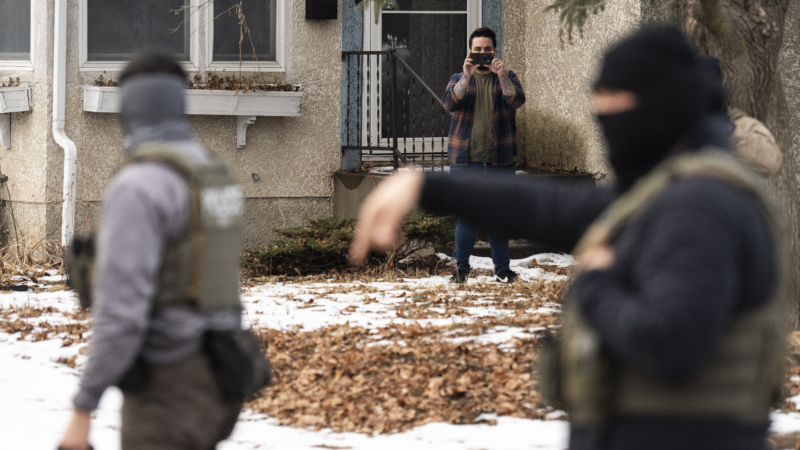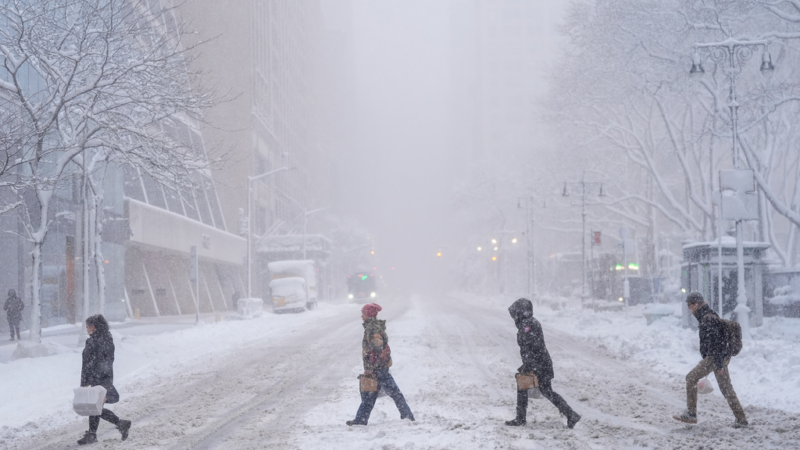Deploying troops to Chicago is not legally justified, says Illinois attorney general
President Trump argues the National Guard is needed in Chicago — a city that had its fewest summer murders in 60 years — because it is overrun with crime.
But the conditions to legally justify troop deployments in Chicago simply don’t exist, Illinois Attorney General Kwame Raoul told Morning Edition. The state filed a lawsuit Monday against the Trump administration in which it argues that the Illinois National Guard can only be federalized if there is a foreign invasion, rebellion or if the federal government is unable to enforce federal laws.
The only “agitation” and “chaos” in and around Chicago, Raoul said, is from “[Immigration and Customs Enforcement] and Border Patrol firing pepper gas at civilians, journalists,” and “even Chicago police officers.”

For weeks, the Trump administration has carried out aggressive immigration enforcement in Chicago, including a recent raid of an apartment building during which agents pulled residents, including children, out of their homes and detained some U.S. citizens.
The actions have led to tense standoffs between protestors and federal agents. A Border Patrol agent shot a woman in the city’s southwest side last week. Agents claimed the woman was armed and that she and other protestors were using cars to box in agents, WBEZ reports.
Raoul told NPR’s Steve Inskeep that it is evident the Trump administration’s actions against Chicago are “political in nature.” Trump has vowed for weeks to clean up crime in Chicago, though the city has experienced a decline in most major crime categories this year, according to WBEZ.
Last month, Trump said he would “love to have” Illinois Gov. JB Pritzker call the White House to make a formal request for troops. The president also posted on Truth Social last month that the city was going to find out “why it’s called the Department of WAR.”
“All of these communications coming from the president and members of his administration demonstrate that this is about political targeting, not about conditions on the ground in Chicago or anywhere in the state of Illinois,” Raoul said.
In an emailed statement, White House spokeswoman Abigail Jackson said “Amidst ongoing violent riots and lawlessness, that local leaders like Pritzker have refused to step in to quell, President Trump has exercised his lawful authority to protect federal officers and assets. President Trump will not turn a blind eye to the lawlessness plaguing American cities.”
A federal judge did not immediately block the Trump administration from deploying troops to Chicago as Illinois requested in its lawsuit — including the deployment of some troops from Texas and other states. Oral arguments in that suit are set for Thursday.
Richard Hayes, who served as former Illinois National Guard Adjutant General — its highest ranking member — said in an interview with Morning Edition if and when troops are deployed, the public should know there are things soldiers are or aren’t supposed to do.
“All soldiers — sailors, airmen, Marines, space guardians — they have a duty to follow legal orders just as much as they have a duty to not follow illegal ones. So you’re duty-bound either direction,” Hayes said.
But Raoul said troop deployment is still cause for alarm because these are not “normal times.”
“I don’t have any negative feelings about National Guardsmen when they’re serving their country, but it’s how they’re being directed that I’m concerned about,” Raoul said.
On the prospect of Illinois’ lawsuit being appealed all the way to a Trump friendly Supreme Court and troops being deployed in Chicago, Raoul said “that would be a very dangerous thing to occur.”
“It’s un-American. This is not what we expect in our country, to be subject to military deploying in our streets to do civilian law enforcement work,” Raoul continued “It’s not what we do in the United States of America.”
This digital article was edited by Treye Green. The radio version was produced by Mansee Khurana and Nia Dumas.
Transcript:
STEVE INSKEEP, HOST:
OK. So what are the legal arguments here really? We’re going to hear from the man who filed a lawsuit to stop the deployment of the National Guard to Chicago. He is the attorney general of the state of Illinois, Kwame Raoul. Attorney General, good morning.
KWAME RAOUL: Good morning. Thanks for having me.
INSKEEP: OK. So as we just heard from Jaclyn, the judge said the troops can come for now, but further arguments lie ahead. So I want to hear your case, starting with the basic fact – what is the legal standard for the president taking charge of the National Guard in this way?
RAOUL: First of all, the judge didn’t say the troops can come. She said she hasn’t decided yet.
INSKEEP: Got it.
RAOUL: She delayed her decision.
INSKEEP: OK.
RAOUL: The legal basis is the militia clause of the Constitution gives Congress the power to determine when the president can federalize the Guard. Posse comitatus says if you have a foreign invasion, which we do not have, or if you have a rebellion, or if the federal government is unable to carry out their responsibilities, then the Guard can be federalized. None of those conditions exist. And the federal government is doing their job. The local law enforcement is doing their job keeping peace. There’s no civil unrest. The only agitation we see, the only chaos we see is ICE and Border Patrol firing pepper gas at civilians, journalists, even Chicago police officers have been subjected to it. Protests are peaceful. There’s no civil unrest.
INSKEEP: We’ve been around Chicago. I was there the other day. I understand exactly what you’re saying. At the same time, I wonder if you’re going to have a challenge in court. You know, the president asserts that these conditions exist. And when he deployed troops in Los Angeles, somewhat different case, but the courts broadly deferred to the president’s opinion on those questions. They let him judge what’s an emergency, for example. Do you have any fact or argument that’s going to differ from Los Angeles?
RAOUL: Yeah. It’s clearly evident that this is political in nature, and it’s not in response to any unrest or any conditions on the ground. The president has said for months that he wanted to target Chicago. He’s disparaged Chicago. He and other members of his administration have said that. He’s posted memes saying Chicago is about to find out why we call it the Department of War. All of these communications coming from the president and members of his administration demonstrate that this is about political targeting, not about conditions on the ground in Chicago or anywhere in the state of Illinois.
INSKEEP: I’m wondering if you might run into another political problem down the line. You go to court, say, as you already have, and suppose the judge rules for you and finds that this is an improper deployment of the National Guard. The administration makes an emergency appeal to the Supreme Court, and the Supreme Court says what it has said in numerous other cases this year – we’re going to defer to the president and let the president do what he wants, and we will decide sometime next year if it was legal or not.
RAOUL: Well, that would be a very dangerous thing to occur. This is unprecedented. This is about the president of the United States militarizing American cities. It’s un-American. This is not what we expect in our country to be subject to military deploying in our streets to do civilian law enforcement work. It’s not what we do in the United States of America.
INSKEEP: Is there any legal difference between summoning troops from Illinois, which the president has done, or using troops from Texas, which the governor of Texas has volunteered for service?
RAOUL: Well, there is slightly. You know, you don’t go into the question of whether or not our governor has consented to the National Guard, but yet and still, in order to deploy National Guardsmen into the streets into the state of Illinois, you still need to meet the prerequisites for deploying the National Guard.
INSKEEP: I want to ask – bring in another perspective here and ask how alarmed you feel people should be in Chicago of the idea of several hundred federal troops at this point, heading to their streets, or federalized troops. Earlier on the program, we spoke with Richard Hayes. He served as a former adjutant general of Illinois, meaning he was Illinois’ highest-ranking member of the National Guard. And he essentially was telling us earlier on the program, don’t get too upset here, even when the troops come. There are a lot of things they can’t and shouldn’t legally do. Let’s listen.
(SOUNDBITE OF ARCHIVED NPR CONTENT)
RICHARD HAYES: All soldiers, sailors, airmen, Marines, Space Guardians, they have a duty to follow legal orders just as much as they have a duty to not follow illegal ones. So you’re duty-bound either direction. And so that is grounded in you since you really join the military, from basic training all the way through your career. And so they’re going to drive everything they do against the criteria that would be appropriate between legal and illegal orders.
INSKEEP: I understood General Hayes to be saying, it’s OK. Troops can guard federal buildings. That’s actually normal. They can do a number of other things, but they’re unlikely to be used for law enforcement to turn their weapons on the people or anything like that. Are you reassured?
RAOUL: I am not. In normal times, I would be with the normal leadership. But what we’ve seen in the Department of Defense and – is a disrespect for our nation’s well-decorated military leaders. And so I’m concerned about who the directions are going to come from. And that does cause alarm. I was in D.C. a couple of weeks ago, and, you know, I told people that they should be respectful of National Guardsmen because they’re not volunteering to do this. They’re being ordered to do this. And so I don’t have any negative feelings about National Guardsmen. They’re serving their country. But it’s how they’re being directed that I’m concerned about.
INSKEEP: We’ve heard the same thing from National Guard troops here in Washington, D.C. We’ve had reporters out talking with them and they’re like, hey, I’m just doing my job. I’m trying to be helpful here. But let me ask what you think the larger plan is here because I noticed that while the president has talked about rebellion and war, he’s only mobilized a few hundred troops to attempt to get them into Portland. He’s only mobilized a few hundred troops to try to get them to Chicago, a city of millions of people. Very small deployment. Do you assume that this is a way to prepare for some much larger deployment of troops if they can get the court’s permission to do so?
RAOUL: Well, one of the things that I have articulated, and we’ve said in our pleadings, is that the president has said, has articulated that he wants to use the cities of America as military training grounds. It’s come out of his own mouth. So there’s your evidence.
INSKEEP: Kwame Raoul is the attorney general of Illinois, and his office has filed a lawsuit seeking to stop the deployment of the National Guard to Chicago. We’re waiting on a ruling. Attorney General, thanks so much.
RAOUL: Thanks for having me.
(SOUNDBITE OF I AM AN INSTRUMENT’S “PART IV”)
The FDA creates a quicker path for gene therapies
The Food and Drug Administration aims to evaluate treatments for rare diseases based on plausible evidence that they would work — without requiring a clinical trial first.
BAFTAs apologize after guest with Tourette syndrome uses racial slur during ceremony
A man with Tourette syndrome shouted a racial slur and other offensive remarks during the BAFTA awards ceremony Sunday. The BBC did not edit out his outbursts in its delayed broadcast.
‘Everything was in pieces:’ Lindsey Vonn describes grueling surgery on broken leg
In a recent video, the Olympic skier credits her surgeon with saving her leg from potential amputation.
A new lawsuit alleges DHS illegally tracked and intimidated observers
Observers watching federal immigration enforcement in Maine who were told by agents they were "domestic terrorists" and would be added to a "database" or "watchlist" are now part of a new federal class action lawsuit.
Kate Hudson on regret, rom-coms and finding a role that hits all the notes
Hudson always wanted to sing, but feared it would derail her acting career. Now she's up for an Oscar for her portrayal of a hairdresser who performs in a Neil Diamond tribute band in Song Sung Blue.
A powerful winter storm is roiling travel across the northeastern U.S.
Forecasters called travel conditions "extremely treacherous" and "nearly impossible" in areas hit hardest by the storm, and air and train traffic is at a standstill in many parts of the region.







